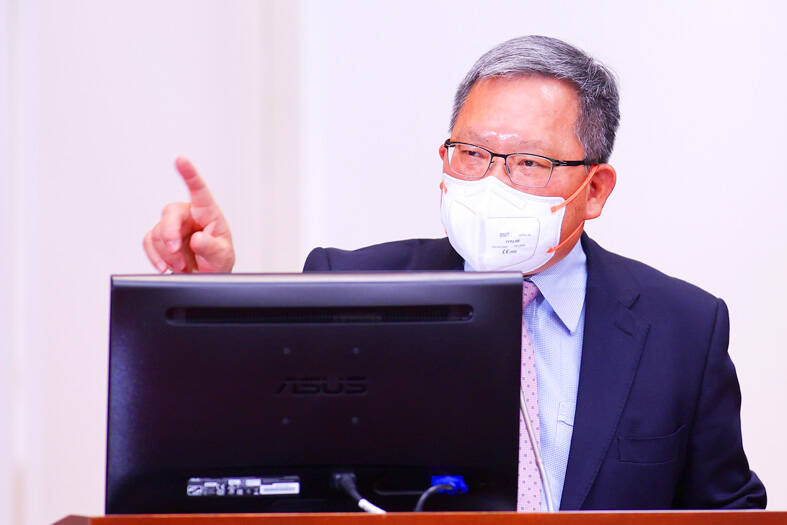Taiwan does not have the “Dutch disease,” Minister of Finance Su Jain-rong (蘇建榮) said yesterday, referring to an overreliance on a temporarily surging sector at the cost of other industries.
The government supports a variety of sectors, not just the semiconductor industry, whose development “does not harm other sectors,” he said.
Su’s comments came after opposition lawmakers said that Taiwan has become overly reliant on a few tech firms, while non-tech manufacturing sectors are declining.

Photo: CNA
The term “Dutch disease” was coined in 1977 by The Economist to describe the decline of the Dutch manufacturing sector after the discovery of the large Groningen natural gas field in 1959.
The Netherlands posted annual trade surpluses from 1970 to 1980 on the back of natural gas exports, which drove up the country’s currency and led to manufacturers becoming less competitive internationally, with many eventually moving their production abroad.
Lawmakers said the local economy is comparable to the Netherlands at the time.
Taiwan’s “small and open” economy is taking a similar development as the European country, with increasing reliance on chip exports, and profitability and wages in the chip sector and other industries increasingly diverging, they said.
Su dismissed the comparison, saying the government has sought to promote the “five plus two” industries by developing Taiwan into a regional technology hub, shoring up local firms that supply smart machinery, and developing green energy sources, biomedicine and national defense.
President Tsai Ing-wen (蔡英文) is seeking to establish a new agricultural model and a circular economy, Su said.
Local semiconductor firms command global leadership positions, but small and medium-sized firms in other sectors also contribute significantly to GDP growth and employ many people, he said.
The central bank has said that Taiwan’s non-tech manufacturers, such as suppliers of plastic and chemical products, remain competitive, although they generate less added value than local tech firms.
Local makers of steel products, bicycles and vehicle parts have gained significant global market shares, the central bank said.
However, non-tech manufacturers lag behind tech firms in terms of wages, but that is due to supply and demand in the job market, rather than resource distribution or currency movements, it said.
Local electronics suppliers have benefitted from a work-from-home boom during the COVID-19 pandemic and global supply chains moving away from China, the central bank said.

Hon Hai Precision Industry Co (鴻海精密) yesterday said that its research institute has launched its first advanced artificial intelligence (AI) large language model (LLM) using traditional Chinese, with technology assistance from Nvidia Corp. Hon Hai, also known as Foxconn Technology Group (富士康科技集團), said the LLM, FoxBrain, is expected to improve its data analysis capabilities for smart manufacturing, and electric vehicle and smart city development. An LLM is a type of AI trained on vast amounts of text data and uses deep learning techniques, particularly neural networks, to process and generate language. They are essential for building and improving AI-powered servers. Nvidia provided assistance

DOMESTIC SUPPLY: The probe comes as Donald Trump has called for the repeal of the US$52.7 billion CHIPS and Science Act, which the US Congress passed in 2022 The Office of the US Trade Representative is to hold a hearing tomorrow into older Chinese-made “legacy” semiconductors that could heap more US tariffs on chips from China that power everyday goods from cars to washing machines to telecoms equipment. The probe, which began during former US president Joe Biden’s tenure in December last year, aims to protect US and other semiconductor producers from China’s massive state-driven buildup of domestic chip supply. A 50 percent US tariff on Chinese semiconductors began on Jan. 1. Legacy chips use older manufacturing processes introduced more than a decade ago and are often far simpler than

STILL HOPEFUL: Delayed payment of NT$5.35 billion from an Indian server client sent its earnings plunging last year, but the firm expects a gradual pickup ahead Asustek Computer Inc (華碩), the world’s No. 5 PC vendor, yesterday reported an 87 percent slump in net profit for last year, dragged by a massive overdue payment from an Indian cloud service provider. The Indian customer has delayed payment totaling NT$5.35 billion (US$162.7 million), Asustek chief financial officer Nick Wu (吳長榮) told an online earnings conference. Asustek shipped servers to India between April and June last year. The customer told Asustek that it is launching multiple fundraising projects and expected to repay the debt in the short term, Wu said. The Indian customer accounted for less than 10 percent to Asustek’s

Gasoline and diesel prices this week are to decrease NT$0.5 and NT$1 per liter respectively as international crude prices continued to fall last week, CPC Corp, Taiwan (CPC, 台灣中油) and Formosa Petrochemical Corp (台塑石化) said yesterday. Effective today, gasoline prices at CPC and Formosa stations are to decrease to NT$29.2, NT$30.7 and NT$32.7 per liter for 92, 95 and 98-octane unleaded gasoline respectively, while premium diesel is to cost NT$27.9 per liter at CPC stations and NT$27.7 at Formosa pumps, the companies said in separate statements. Global crude oil prices dropped last week after the eight OPEC+ members said they would